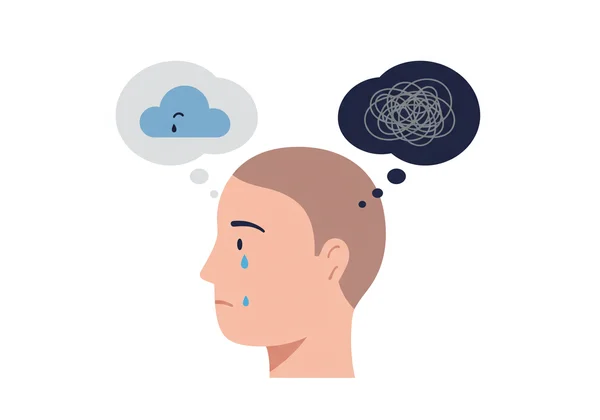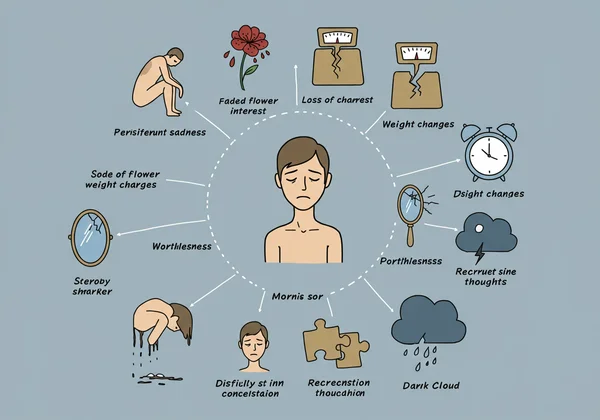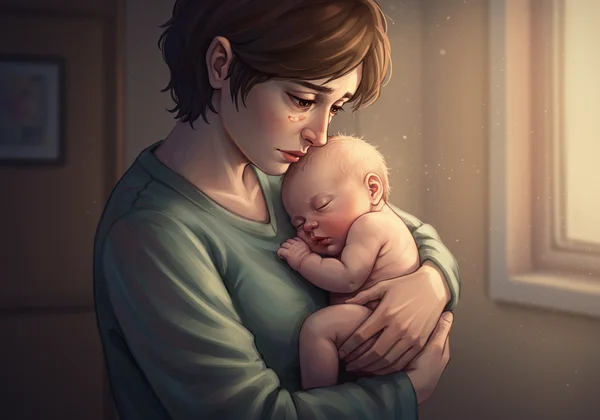うつ病の種類:症状と検査を受けるべき時期
July 27, 2025 | By Liam Thornton
気分が落ち込んでいるけれど、一時的なものなのか、それ以上なのか確信が持てませんか?多くの人が一般的な悲しみとうつ病を混同していますが、うつ病は複雑な病気であり、さまざまな形態があり、それぞれに独特の症状があります。これらの違いを理解することが、明確さとサポートを見つけるための第一歩です。私はうつ病なのでしょうか、それともただ悲しいだけなのでしょうか? これは私たち多くの人が尋ねる質問です。このガイドでは、一般的な うつ病の種類 を掘り下げ、ご自身や愛する人の特定の兆候を認識し、うつ病の検査 を受けるべきかどうかを判断するのに役立ちます。この知識を得ることは、自己肯定感を高める行為であり、最初のステップとして、シンプルで秘密厳守のオンライン自己評価があります。

大うつ病性障害(MDD)の症状を理解する
ほとんどの人が「うつ病」と聞いて思い浮かべるのは、一般的に大うつ病性障害(MDD)、または臨床的うつ病として知られるものです。これは、持続的な悲しみや、かつて楽しんでいた活動への深い興味の喪失を特徴とします。専門家による診断を受けるには、これらの症状が少なくとも2週間存在する必要があります。オンラインの 大うつ病性障害テスト は、ご自身の症状がMDDに当てはまるかどうかを確認するための有用な予備的スクリーニングツールとなり得ます。
MDDの主な警告サインは何ですか?
MDDの経験には個人差が大きく、メンタルヘルスの専門家は、しばしばいくつかの主要な症状に注目します。これらの 注意すべき症状 を認識することは、早期介入のために非常に重要です。
-
持続的な悲しみ、不安、または「虚無感」のある気分。
-
趣味や活動への興味または喜びの喪失。
-
ダイエットをしていないにもかかわらず、著しい体重減少、または体重増加。
-
ほとんど毎日、不眠症または過眠症。
-
無価値感または過度な罪悪感。
-
思考、集中、または意思決定の困難。
-
死や自殺についての反復的な考え。

違い:それは悲しみか、それとも大うつ病か?
悲しみは、困難な出来事に応じて生じたり消えたりする正常な人間の感情ですが、大うつ病は持続的な精神状態です。主な違いは、期間、強度、および影響にあります。悲しみは通常、時間とともに消えますが、うつ病は長引き、日常生活に著しい支障をきたし、仕事、人間関係、身体の健康に影響を与える可能性があります。気分が晴れず、蔓延しているように感じる場合は、それは単なる悲しみ以上のものです。
ブルーを超えて:非定型的うつ病と「スマイリングうつ病」を探る
すべてのうつ病が同じように見えるわけではありません。一部の形態は、持続的な悲しみという古典的な症状を示さず、認識がより困難になることがあります。これらはしばしば非定型的うつ病と呼ばれ、「スマイリングうつ病」のような状態が含まれることがあります。包括的な うつ病スクリーニングテスト は、これらの分かりにくいパターンを特定するのに役立つことがあります。
非定型的うつ病の現れ方
その名前とは裏腹に、非定型的うつ病 は実際にはかなり一般的です。その主な特徴は「気分の反応性」であり、肯定的な出来事に応じて気分が一時的に明るくなることがあります。
-
顕著な体重増加または食欲増加。
-
通常よりもはるかに多く眠ること(過眠症)。
-
腕や脚に重い、鉛のような感覚。
-
拒絶や批判に対する極度の感受性、人間関係に影響を与える。
スマイリングうつ病とは何か、そしてそれをどう認識するか?
スマイリングうつ病 は、個人が幸せで活動的な仮面の下に内面の葛藤を隠す、高機能うつ病の特定な形態です。彼らは安定した仕事を持ち、活気のある社交生活を維持し、他者には成功しているように見えるかもしれませんが、内面では古典的なうつ病の症状に苦しんでいます。この仮面は、他者—そして時には本人自身—が問題に気づくことを非常に困難にします。もしあなたが自分の苦しみを隠していると感じるなら、秘密厳守の無料うつ病テストを受けることが、自己認識 へのプライベートな第一歩となり得ます。

季節性感情障害(SAD):季節性うつ病の認識
日照時間が短く、暗くなるにつれて、気分やエネルギーが低下するかもしれません。あなたは 季節性感情障害(SAD) を経験している可能性があります。これは季節の変化に関連するうつ病の一種です。通常は秋に始まり、冬の間続きます。エネルギーを奪い、気分を落ち込ませます。一般的ではありませんが、春や夏にSADを経験する人もいます。
冬期うつ病の一般的な症状
暗い時期に発生するSADの症状は、しばしば 冬期うつ病 と呼ばれ、特徴的で繰り返されるもの です。これらには、過眠、食欲の変化(特に炭水化物を渇望する)、体重増加、社会的引きこもりや「冬眠」が含まれる傾向があります。この年間のパターンを認識することが、効果的に管理するための鍵です。

産後うつ病:ベビーブルーズを超える症状
新しい赤ちゃんを授かることは、興奮から不安まで、強力な感情の波をもたらすことがあります。多くの新しい母親は「ベビーブルーズ」を経験しますが、これは気分変動や2週間以内に消える涙もろさを伴います。しかし、産後うつ病 は、より重度で長引くうつ病の形態です。あなたが新しい親で、心の健康 に悩んでいるなら、産後うつ病テストがあなたの感情を理解するための有効なツールであることを知ってください。
「ベビーブルーズ」が産後うつ病になる時
「ベビーブルーズ」は一般的ですが、産後うつ病と混同してはいけません。ベビーブルーズ は、より軽度で自然に解決する症状によって特徴づけられます。産後うつ病は、赤ちゃんを世話したり日常のタスクをこなしたりする能力を妨げる、より激しい症状を伴います。これらには、重度の気分の変動、赤ちゃんとの 愛着形成 の難しさ、激しいイライラ、そして自分自身や子供を傷つけることについての考えが含まれることがあります。この状態は、サポートと専門的なケアを必要とします。

その他のうつ病の種類とそのニュアンス
うつ病の世界は複雑で、知っておくべき 他のいくつかの特定のタイプがあります。これらのニュアンスを理解することは、あなたの経験に適切な言葉を見つけ、適切な助けを求めるための鍵となります。多くの人が、双極性うつ病テストがあるかどうか疑問に思っていますが、スクリーニングツールは存在しますが、他の気分障害と区別するためには専門家による診断が不可欠です。
双極性うつ病の症状の理解
双極性障害は、感情の高揚(躁病または軽躁病)と低下(うつ病)を含む極端な気分の変動を特徴とします。双極性障害のうつ病エピソードは、MDDと多くの症状を共有します。しかし、エネルギーの亢進、多幸感、またはイライラ感の期間である躁病エピソードの存在が、双極性障害を定義するものです。双極性うつ病の治療はMDDとは大きく異なるため、医療提供者による正確な診断が不可欠です。
高機能うつ病とは?
スマイリングうつ病と同様に、高機能うつ病—または持続性気分障害(PDD)または軽うつ病とも呼ばれます—は、MDDよりも症状が軽度な、慢性的で長期的なうつ病の症状を伴います。個人は依然として仕事や学校に行くことができますが、常に喜びを感じられず、疲れていて、生産性がないと感じるかもしれません。彼らはまだ「機能している」ため、自分の感情を「ただそういうものだ」と軽視しがちですが、サポートと管理戦略は彼らの生活の質を大幅に向上させることができます。オンラインうつ病テストは、これらの持続的ではあるが微妙な感情を 認識を助ける のに役立ちます。
理解と次のステップを力づける
うつ病が単一で均一な病気ではないと認識することは、自己認識と癒しのための最初のステップです。MDDの 広範囲にわたる気分の落ち込み から スマイリングうつ病 の隠された苦しみまで、各タイプには独自の兆候があります。これらのうつ病の症状を理解することで、あなた自身や愛する人が何を経験しているかをより良く特定できます。
この知識は、次のステップを踏み出す力を与えてくれます。これらの説明のいずれかがあなたに当てはまる場合は、さらに探求するサインと考えてください。素晴らしい出発点は、私たちのプラットフォームでうつ病テストを受けることです。それは無料、秘密厳守で、科学的に検証されたスクリーニングツールに基づいています。あなたはあなたの 心の状態 の即時概要を受け取り、パーソナライズされた 洞察と 実行可能な アドバイスを得るための、より深い、AI駆動の分析のためのオプションもあります。
免責事項:この記事は情報提供のみを目的としており、医学的アドバイスを構成するものではありません。テストはスクリーニングツールであり、診断ツールではありません。健康上の懸念については、資格のある医療専門家にご相談ください。
うつ病の種類と症状に関するよくある質問
私はうつ病ですか、それともただ悲しいだけですか?
悲しみは特定の原因に関連する一時的な感情ですが、うつ病は少なくとも2週間、気分、思考、機能能力に影響を与える持続的な精神的健康状態です。気分の落ち込みが絶えず、あなたの生活に支障をきたしている場合、それは単なる悲しみ以上のものかもしれません。
うつ病の警告サインは何ですか?
主な 注意すべき症状 には、持続的な悲しみまたは虚無感のある気分、活動への興味の喪失、睡眠または食欲の変化、疲労感、無価値感、集中困難が含まれます。具体的な兆候は、うつ病の種類によって異なる場合があります。
双極性うつ病のテストはありますか?
スクリーニング質問票は、うつ病や躁病の症状を特定するのに役立ちますが、双極性障害の診断には、精神科医または他のメンタルヘルス専門家による包括的な評価が必要です。これは、他の状態と区別することが複雑であり、適切な治療にとって重要であるためです。
スマイリングうつ病とは何ですか?
スマイリングうつ病とは、外面上は幸せで成功しているように見える人が、内面では重度のうつ病の症状を経験している状態です。彼らは自分の苦しみを隠しており、それが他者には気づかれにくいため、特に危険です。
私がうつ病かどうかを確認するにはどうすればよいですか?
最初のステップは、秘密厳守の無料オンライン うつ病スクリーニングテスト を受けることです。当社のオンラインうつ病スクリーニングツールは、確立された原則に基づいた予備的な評価を提供します。正式な診断については、専門家に相談する 必要があります。専門家による完全な評価が必要です。